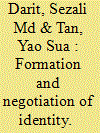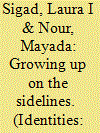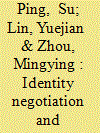|
|
|
Sort Order |
|
|
|
Items / Page
|
|
|
|
|
|
|
| Srl | Item |
| 1 |
ID:
117835


|
|
|
|
|
| Publication |
2012.
|
| Summary/Abstract |
This article examines power implications of digital diasporas and the identity negotiation processes they afford. Members of diasporas are potentially socially and psychologically disempowered by two sources: the majority society into which they are dispersed; and the traditional social structures and culture from which they emerged. This potential disempowerment highlights the important role of power in facilitating (or not) migrant integration into new societies, and the integration of values and norms that are increasingly considered universal. The diaspora experience and Internet discussion forums provide enabling normative structures and discourses for individuals to define and pursue their own interests and ideals. Following a review of the literatures on diaspora identity hybridity and power, the case of TibetBoard illustrates how information technology enables diaspora members to explore, negotiate, and validate their self-determined identity and political perspectives, moving beyond passive adoption of traditional perspectives rooted in the Tibetan community of the homeland and in exile.
|
|
|
|
|
|
|
|
|
|
|
|
|
|
|
|
| 2 |
ID:
157948


|
|
|
|
|
| Summary/Abstract |
This article examines the formation and negotiation of identity among the Kampung Pasir Parit Peranakan Chinese, a unique sub-ethnic group of acculturated Chinese in Kelantan. Apart from their original Chinese identity, the Kampung Pasir Parit Peranakan Chinese have also adopted two additional identities, namely Malay and Siamese identities. Intermarriage with Siamese women in the early years is the main reason for the adoption of the Siamese identity, while regular social interactions with the local Malays have led to the adoption of a Malay identity. Thus, the identity of the Kampung Pasir Parit Peranakan Chinese comprises three contrasting components. Given such a complex identity, there is always a need for the Kampung Pasir Parit Peranakan Chinese to negotiate their identities to avoid any identity crisis. This negotiation of identity is at times demonstrated by the co-existence of identities and at times the clear demarcation of identities to fulfil different situational needs.
|
|
|
|
|
|
|
|
|
|
|
|
|
|
|
|
| 3 |
ID:
167643


|
|
|
|
|
| Summary/Abstract |
By examining the experiences of the children of Palestinian collaborators whose families have relocated to Israel, this study explores how youth negotiate self within the context of marginalisation and cultural dislocation. Due to the actions of their parents, the research participants have become outsiders and outcasts in their Palestinian communities of origin, outsiders in Israel, and outsiders among Israeli-Arabs. Based on qualitative, in-depth interviews with 11 Palestinian male youths, we describe and analyse the experience of identity negotiation in the context of fear and their families’ past deceit. Our findings highlight that the youths’ identities are negotiated by engaging in a dialogue of self on belonging and not belonging that is based on visions of their past, present and future selves. This is accompanied by a forced dialogue with others, explaining who they are in order to fit in with the ‘audience’, a presentation that is then acted out.
|
|
|
|
|
|
|
|
|
|
|
|
|
|
|
|
| 4 |
ID:
186167


|
|
|
|
|
| Summary/Abstract |
This article examines the lives of African-Chinese mixed-race children in Guangzhou, China. Based on ethnographic fieldwork in the city, the article explores the negotiation of identity and belonging of these children of mixed African and Chinese heritage. Occupying a third space between two or more ethnicities and cultures, mixed African-Chinese children often develop a sense of double consciousness and hybrid identities in response to the Chinese gaze, which denies their Chineseness. The fluidity and hybridity in their identification may facilitate their integration into Chinese society by assisting them in gaining acceptance in different social spaces, such as churches, neighborhoods, and schools, but the structural marginalization they are subject to as liminal people separates them from the mainstream social groups, producing their segregated integration.
|
|
|
|
|
|
|
|
|
|
|
|
|
|
|
|
| 5 |
ID:
085870


|
|
|
|
|
| Publication |
2009.
|
| Summary/Abstract |
This article is based on interviews with young urban dalits in the Indian Punjab and Wolverhampton, UK, and aims to chart their experience of caste border crossings in personal relationships. It links their narratives to the larger political economic context of their respective locations. It suggests that, perhaps due to their preoccupation with economic independence, dalit youth in Punjab are less concerned about maintaining caste borders in marriage than their counterparts in Wolverhampton. Dalit youth in Wolverhampton have experienced caste-related bullying during their schooling that is inexplicable to them given their location in a supposedly casteless society in the United Kingdom, and as a result they seem to be pessimistic about the erosion of caste through crossing caste borders in marriage. Whilst showing reluctance in risking further insult by crossing caste borders in marriage, in their friendships, including sexual relationships, they are willing and able to cross these borders. The paper concludes with a comparison of different explanations and remedies for dealing with caste prejudice in personal relations. It offers the suggestion that the negotiations of dalit identity are best understood by locating them in larger religious, immigrant, national contexts on the one hand and within the intra-personal on the other: radical positioning in the overt political domain may go hand in hand with the embracing of fluidity in the personal domain.
|
|
|
|
|
|
|
|
|
|
|
|
|
|
|
|
|
|
|
|
|